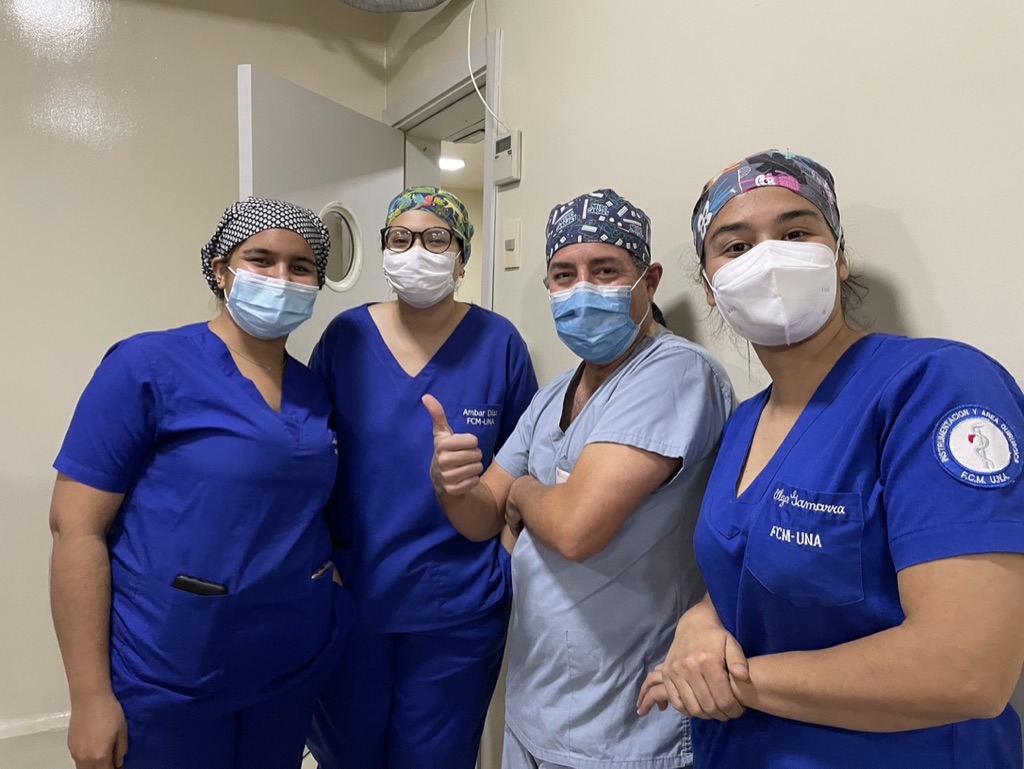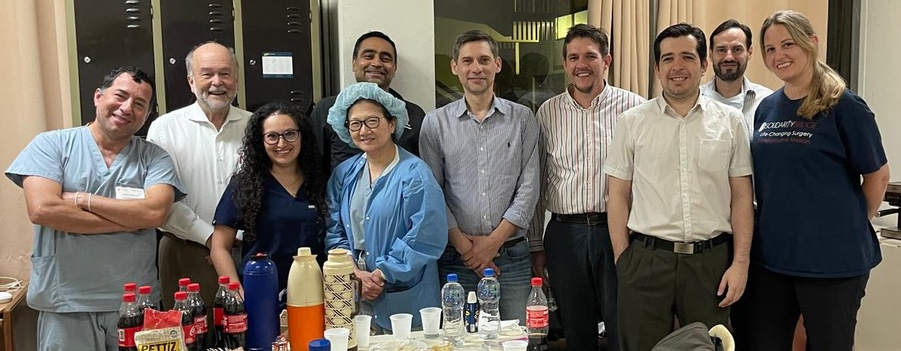Brigham Team Collaborates with Paraguay Hospital to Treat Patients with Life-Threatening Brain Condition

Carlos Vazquez (second from right) was among three members of a Brigham neurosurgical team who traveled to Paraguay to care for patients in collaboration with local health care professionals, also pictured above.
Motivated by the desire to expand access to advanced health care, a Brigham neurosurgical team recently traveled to Paraguay to perform a lifesaving surgery for three young patients. Their trip also kickstarted a multi-year collaboration with a team at a hospital in Paraguay’s capital, Asunción, to train local providers on how to perform the same procedure, which treats a life-threatening condition known as arteriovenous malformation (AVM).
AVMs result from deformities in the brain’s blood vessels that occur at birth. The condition causes blood to flow too quickly from the artery to the vein, creating a buildup of pressure that can cause a vein to burst at any moment. Following a rupture, there is a 20 percent chance of death, and the risk of permanent injury to the brain is greater than 40 percent. While surgery can cure AVMs, the condition is rare, and the operation is performed only by a few specialists throughout the world.
This summer, José Kuzli, MD, a neurosurgeon in Asunción, invited Nirav Patel, MD, director of the Brigham’s AVM program in the Department of Neurosurgery, to travel to Asunción to perform AVM surgery for three patients — ages 8, 21 and 37 — and collaborate with Kuzli’s team to establish a training program for neurosurgery providers on the procedure, which is not currently available in Asunción. Patel, joined by Carlos Vazquez, a surgical technician in the Department of Neurosurgery, and Grace Kim, MD, an anesthesiologist in the Department of Anesthesiology, Perioperative and Pain Medicine, arrived in Asunción in late August to meet the three young patients and local neurosurgical team.
Patel, an international expert in repairing AVMs, aims to change the prognosis of patients with this life-threatening condition around the world.
“I feel that helping people with this surgery is what I was put on this Earth to do,” Patel said.
Vazquez and Kim have shared Patel’s mission of making AVM surgery more accessible for years. Vazquez has assisted Patel in surgery for more than a decade, since before they joined the Brigham, and Kim has worked as an anesthesiologist on many complex AVM cases.
“When we work together, the dynamic is streamlined. We know each other so well,” Vazquez said. “I’m really happy we were able to contribute to these patients’ well-being in Paraguay.”
Repairing AVMs is a complex and slow process. Patel’s method is unique and particularly intricate, as he performs the surgery without preoperative embolization — a procedure commonly employed before AVM surgeries to seal arteries. Preoperative embolization uses a vast number of resources, making it especially challenging to incorporate in resource-poor areas of the world. Patel’s approach aims to reduce patient risk and make the procedure more widely accessible.
Patients in Paraguay face other barriers to health care beyond limited access to complex care. While the Brigham team traveled with some supplies that were donated by Boston-area businesses, patients in Paraguay are often required to provide medical supplies for their own procedures, including some medications and heart monitors, Patel explained. Family members of the three patients slept in a tent outside the hospital so they could help with bedside care and provide support as needed. The limited availability of resources in the Asunción hospital remains a long-term obstacle that Kuzli’s team is working to overcome. Patel’s team aims to support efforts to make AVM surgeries sustainably accessible.

Carlos Vazquez (far left), Grace Kim (fourth from left) and Nirav Patel (center left) share a moment with their Paraguayan colleagues, including Jose Kuzli (center right)
While in Paraguay, the Brigham team cared for patients with advanced conditions. One patient was diagnosed with a grade 4 AVM, which is often pronounced inoperable in the United States. Despite these challenges, Patel felt bolstered by his patients’ bravery and the compassionate care the team in Asunción demonstrated.
“There was so much commitment and support all around, including the nurses looking out for every last detail,” he said.
Kim hopes the relationships forged with the care providers and patients in Paraguay will be long-lasting.
“Through this trip, we hoped not only to provide medical care but also to create opportunities for learning and future collaboration,” she said.
Patel believes his collaboration with Kuzli will need outside support while they strive to determine a sustainable method for doctors to provide AVM surgery independently in Paraguay. The August trip was funded in part by Solidarity Bridge, an American nonprofit, and several Boston-area companies. Patel is seeking funds to support another visit within the next six months.
The team in Asunción continues to send Patel updates on their patients’ progress. Each patient is recovering well and has returned home.
Reflecting on his work with the team in Paraguay, Patel expressed gratitude for everyone’s commitment to the project.
“AVMs are something we can cure. It just fits that we should be training people to do this surgery and finding ways to make it sustainably available,” he said. “There aren’t huge numbers of patients affected by AVMs, but these patients are real people in need of medical care, which can cure them for life.”


Leave a Reply